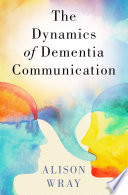

Most ebook files are in PDF format, so you can easily read them using various software such as Foxit Reader or directly on the Google Chrome browser.
Some ebook files are released by publishers in other formats such as .awz, .mobi, .epub, .fb2, etc. You may need to install specific software to read these formats on mobile/PC, such as Calibre.
Please read the tutorial at this link: https://ebookbell.com/faq
We offer FREE conversion to the popular formats you request; however, this may take some time. Therefore, right after payment, please email us, and we will try to provide the service as quickly as possible.
For some exceptional file formats or broken links (if any), please refrain from opening any disputes. Instead, email us first, and we will try to assist within a maximum of 6 hours.
EbookBell Team

4.7
66 reviewsIt is well recognized that when people are living with a dementia, effective communication can be a challenge for both them and those they interact with. Despite a plethora of good advice, it can be surprisingly hard to sustain constructive communicative behaviours and to integrate them successfully into routine daily care and interaction.
The Dynamics of Dementia Communication asks why that is. What is it about communication, as a human social and cognitive practice, that makes it so difficult to manage the disruptions caused by dementia? Why is it so common to feel awkward, confused or irritated when talking with a person living with a dementia? Why is the experience of living with a dementia so personally and socially devastating? What approaches to communication would work best, and why?
To answer these questions, the book integrates information from a wide range of different sources, covering the biological, social, and emotional factors associated with the dementia experience. New concepts and theoretical perspectives offer novel ways of thinking about the challenges of communication generally, and in the context of dementia. Topics explored include whether it is acceptable to deceive people living with a dementia and why society's failure to support people living with a dementia and their carers is so devastating. The final chapter suggests what people living with a dementia need if communication is to promote and protect everyone's well-being.
By providing a deeper understanding of what topples the best-intentioned attempts at interaction, and by explaining why poor communication affects everyone involved, this book sets new agendas for improving the welfare of people living with a dementia, their families, and professional carers.